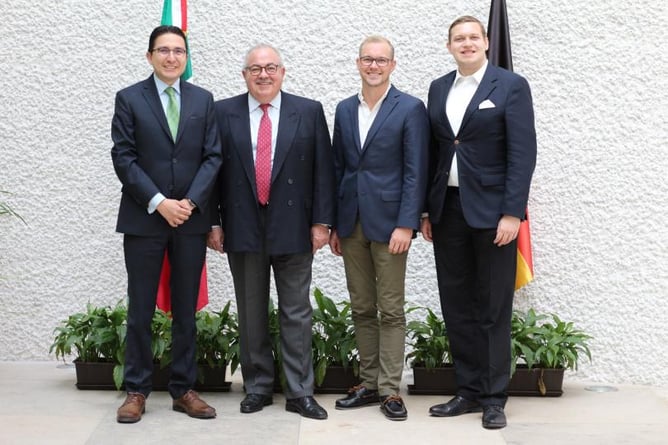1. Your Excellency, many highly qualified students from Mexico come to Germany for their studies. According to the German Academic Exchange Service (DAAD), 3,147 Mexican students were enrolled at German universities in the 2017/18 winter semester. How do you assess the high interest of young people from Mexico in studying at German universities?
H.E.: In terms of student mobility, Germany is one of Mexico's main academic partners, as Germany is among the top five destination countries for Mexican students abroad. The estimated annual mobility of Mexican students enrolled in German Higher Institutions at the bachelor's, master's and doctoral level is over 3,300 students. The main areas of study are: engineering, mathematics, natural sciences, biomedicine and social sciences.
In 2018, approximately 340 Mexicans studied in Germany with scholarships granted by the National Science and Technology Council (CONACYT). In the first semester of 2019, 39 students from UNAM (National Autonomous University of Mexico) were enrolled in German universities. Germany is the fifth source of foreign students in our Mexico. Scholarships offered by the Government of Germany to Mexicans are awarded directly, through the German Academic Exchange Service (DAAD).
2. What difficulties do you currently see in the access of students from non-EU countries to German higher education institutions?
H.E.: There are not enough funding support options and mobility programmes. Considering the increasing interest of Mexican students who want to come to German higher education institutions, it is relevant to get more scholarships and mobility, or double degree programmes between institutions of both countries. Every day, we receive enquiries of information from Mexican students who are looking for scholarships or exchange programmes to study or to carry out research projects in Germany.
We also face the challenge of German language proficiency. Although there are many study
programmes carried out in English, most of them are in German and not many Mexicans have the chance to learn this language at their homeland.
3. What measures do you think would make sense to reduce these hurdles?
H.E.: In my opinion, we would need to work in two tracks. The first one refers to the direct contact and interaction between authorities of the most relevant higher education and research institutions in Mexico and Germany. In this context it is relevant to encourage visits of delegation of deans and directors of Mexican and German institutions to identify opportunities and specific fields of collaboration and exchange. The second track is to support the networking and showcasing of successful or strategic research projects in order to strengthen the collaboration and knowledge sharing among them.
4. What are the central projects in the cooperation between Mexico and Germany in the field of science and higher education currently?
H.E.: We are organizing a seminar in the context of the Berlin Science Week, on November 8, this year, to showcase research projects carried out with the participation of Mexican experts in German research institutions. During 2020, we are planning visits of delegations of directors and deans of higher education institutions from Mexico to Germany and vice versa. In the level of applied sciences, the experience of German brands car manufacturing plants in Mexico is a good example of how our cooperation in the sector of higher education benefits to both sides.

5. How do you see the role of digital service providers such as Expatrio in facilitating the visa process and university access for overseas students?
H.E.: An initiative like this helps students to pave their way into the German academic landscape and to the new life they will experience in the following couple of years when studying in the country. Academic institutions on both sides of the Atlantic Ocean could benefit from these services to strengthen their mutual links.
6. What importance do Mexican students living in Germany have in the structure of bilateral relations?
H.E.: The Mexican students and researchers are a key element for the academic and scientific cooperation, they contribute to it by creating an important network and interaction between universities, faculties, laboratories and research groups from both countries. Their performance and achievements contribute to the reputation of the Mexican higher education institutions in Germany and when they go back to Mexico they take with them a great experience and knowledge.
7. Mexico also has many highly qualified young people in the field of skilled labor, which is urgently needed in Germany. What potential do you see in this area for intensifying bilateral cooperation?
H.E.: Definitely, this is an area of opportunity in which governments and institutions of both countries should work closely in order to identify possible schemes of cooperation. Mexico could become a major partner country in Latin America for business matching, as some experiences with large German companies with long presence in Mexico have shown the potential of this cooperation.
.png?width=560&name=Untitled%20(20).png)




.png?width=374&name=Untitled%20(20).png)
.jpg?width=374&name=chuttersnap-xmPLXZvQIV8-unsplash%20(1).jpg)


